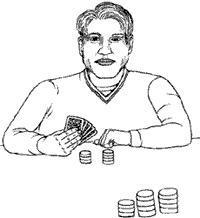
Movies
Rounders (Miramax Films). A cast of critics' darlings (Edward Norton, Matt Damon, John Malkovich) fails to win this poker movie much-hoped-for rave reviews. Individual performances are said to be inspired; the card hall settings are said to be gritty; the dialogue is said to be pleasingly peppered with poker jargon--but the film is deemed "unable to do justice to its potential" (Kenneth Turan, the Los Angeles Times). Objections: a sluggish plot and a predictable setup. Dissenters call the film "snappy and ingratiating" (Slate's David Edelstein) and "completely enjoyable and, at its climactic moments, thrilling" (New York magazine's David Denby). (Read Edelstein's review and Denby's. Or read this interview with Norton.)
One True Thing (Universal Pictures). Meryl Streep and Renée Zellweger as a mother and daughter forced to reconcile in the face of grave illness earn praise in this "East Coast yuppie Terms of Endearment" (Stephen Holden, the New York Times). The film is based on a novel by Anna Quindlen and, though small, is said to be emotionally powerful. (Watch interviews with the stars and director of this film.)
Simon Birch (Buena Vista Pictures). Critics agree that this "reduction" of John Irving's A Prayer for Owen Meany is--in the unkind words of Variety's Dennis Harvey--"syrupy hash." Large parts of the complicated plot and all Irving's dark humor have been excised, resulting in the loss of the author's blessing and the right to use the novel's name. What's left is a string of corny adventures shared by two young boys, one of whom believes he is on a special mission from God. A minority of critics praise the film, most notably Gene Siskel, who gives it four stars and calls it "one of the year's best" (Chicago Tribune). (Read an interview with small star Ian Michael Smith.)
Touch of Evil (Universal Pictures). Based on Orson Welles' 58 page memo detailing his objections to the studio's cut of his much-tinkered-with 1958 noir classic, this re-edited version "unspools with all the complex, unnerving menace and nihilistic subtext its writer-director had in mind all along" (Lisa Schwarzbaum, Entertainment Weekly). Critics take the occasion to rethink the movie itself: "A jammed, discordant, discomforting experience--a nightmare, in fact, but a nightmare that leaves in the wake of many complications a moral significance of disturbing perversity and brilliance" (Denby). "Welles was at the peak of his talent in Touch of Evil, but let's never forget what an abrasive, high-wire, self-destructive talent he was" (Edelstein). (Read Edelstein's review and Denby's. Find out more about the alternate versions of this film.)
Book
Anne Frank, by Melissa Müller (Metropolitan Books). In researching this biography, Müller came across five additional pages of Anne Frank's original diary that had been removed by her father before publication, largely because they reveal unhappy details of his marriage. These pages overshadow the contents of the biography in news coverage of the book, but those who do comment call it "superb" (Laura Shapiro, Newsweek). (This page of Anne Frank-related links includes one to Catherine Bernard's essay "Anne Frank: the Cultivation of the Inspirational Victim.")

Music
Mechanical Animals, by Marilyn Manson (Nothing/Interscope). Heretofore dismissed as "a freak show accompanied by a soundtrack" (Lorraine Ali, the Los Angeles Times), Manson comes out with an album that is "wickedly engaging" (N'Gai Croal, Newsweek). The music is said to be rich and intense, full of pomp and '70s style high-glam à la Ziggy Stardust. The lyrics are the usual--drugs, grim humor, self-hatred, sci-fi sex--but Manson is "no longer instantly dismissible as scam artist or sight gag" (Jim Farber, Daily News). (Check out audio and video clips from the album.)
Teatro, by Willie Nelson (Island). Nelson's 214th album. All his trademark "stark, heart-tugging" lyrics (Dennis Hunt, USA Today), plus more musical frills than expected. Producer Daniel Lanois (Bob Dylan's Time Out of Mind) is given credit for pushing Nelson's sound in unfamiliar directions. Some critics call it his "best album in years" (Tony Scherman, Entertainment Weekly). Others are bemused by Lanois' addition of xylophones, organ, Caribbean rhythm, and atmospheric hoopla. The New York Times' Ben Ratliff marks the appearance of what he calls Nelson's "first trip-hop" song. (Listen to clips from this album.)
Recent "Summary Judgment" columns
Movie--Without Limits;
Movie--Knock Off;
Movie--Next Stop Wonderland;
Death--Akira Kurosawa;
Book--The Professor and the Madman, by Simon Winchester;
Book--At Home in the World, by Joyce Maynard.
Movie--Blade;
Movie--Why Do Fools Fall in Love;
Movie--54;
Book--The Farming of Bones, by Edwidge Danticat;
Music--The Miseducation of Lauryn Hill, by Lauryn Hill.
Movie--Dance With Me;
Movie--Your Friends & Neighbors;
Movie--Unmade Beds;
Television--TheRatPack (HBO);
Book--The First Eagle, by Tony Hillerman;
Book--Summer of Deliverance: A Memoir of Father and Son, by Christopher Dickey;
Book--KaaterskillFalls, by Allegra Goodman.
Movie--The Avengers;
Movie--Return to Paradise;
Movie--The Slums of Beverly Hills;
Music--Whitechocolatespaceegg, by Liz Phair;
Book--The Father of Spin: Edward L. Bernays and the Birth of Public Relations, by Larry Tye;
Book--Philistines at the Hedgerow: Passion and Property in the Hamptons, by Steven S. Gaines.
--Eliza Truitt